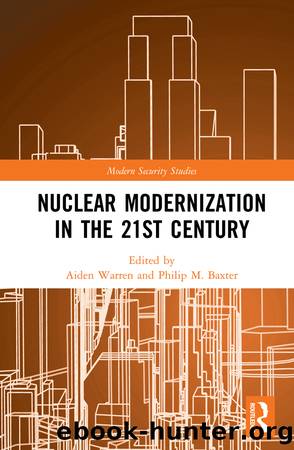Nuclear Modernization in the 21st Century by Aiden Warren & Philip M Baxter

Author:Aiden Warren & Philip M Baxter [Warren, Aiden & Baxter, Philip M]
Language: eng
Format: epub
ISBN: 9781138350557
Google: IL3FwQEACAAJ
Goodreads: 50697597
Publisher: Routledge
Published: 2020-01-15T11:43:24+00:00
The demise of the INF Treaty
Further evidence of the Trump administrationâs drive to redefine and readjust the United Statesâ nuclear weapons position is witnessed in the withdrawal from the INF Treaty. In October 2018, President Trump loosely detailed at a Nevada rally that he would withdraw the United States from the Intermediate-Range Nuclear Forces Treaty (INF) with Russia. The pivotal 1987 agreement prohibits both the U.S. and Russia from possessing or manufacturing ground-launched cruise missiles with a range between 480 to 5,470 kilometers. For several years, the U.S has accused Russia of breaching this deal through the development of a variety of missiles, including âthe Novator 9M729 â known to NATO as the SSC-8.â In his announcement, Trump stated that the U.S. was ânot going to let them violate a nuclear agreement and go out and do weapons and weâre not allowed to ⦠if Russiaâs doing it and if Chinaâs doing itâ then âwe are going to develop the weapons.â49
The main concern with the INF departure is that the Administration did not do anything substantive to persuade or coerce Russia back into compliance, which should have been the defining goal. In fact, it virtually eradicated legal and political pressure on Russia and essentially gave the Kremlin carte blanche to develop and deploy INF systems in greater numbers and without any treaty limitations. To some extent, these developments are hardly surprising given the deterioration of bilateral relations over the last 5â6 years. While Russia under Putin has regularly contravened international agreements, the Trump administration has also undertaken a pattern of withdrawing from such agreements. The President has removed America from more than a dozen international commitments, pointing to an imperative to reassert Americaâs international control by âletting go,â and undermining the very post-World War II liberal international order that the United States defined and orchestrated. Given the INF Treatyâs crucial stabilizing contribution to Europeâs security, Americaâs NATO allies once again questioned the commitment of Trump to the organization itself and broader EU security. That said, according to Kimball and Reif, if NATO member states really wanted to sustain a key arms control treaty that has contributed to their security for more than two decades, they needed to be more assertive and active in insisting that the United States and Russia pursue diplomatic options at an earlier date.50
Clearly, Trumpâs preparedness to end reciprocally beneficial agreements so as to placate his domestic base does not augur well for global stability. On November 4, 2018, Secretary of State Mike Pompeo declared Russia was in material breach of the landmark 1987 Intermediate-Range Nuclear Forces (INF) Treaty and that the United States planned to suspend U.S. requirements under the treaty in 60-days unless Russia returned to compliance. While NATO foreign ministers collectively agree, declaring âthat Russia has developed and fielded a missile system, the 9M729, which violates the INF Treaty [and] it is now up to Russia to preserve the INF Treaty,â the Trump administrationâs thin 60 day demand and âhopeâ that Russia would âchange course,â came across as a concession that the INF Treaty was for all intents and purposes dead.
Download
This site does not store any files on its server. We only index and link to content provided by other sites. Please contact the content providers to delete copyright contents if any and email us, we'll remove relevant links or contents immediately.
What's Done in Darkness by Kayla Perrin(25499)
Shot Through the Heart: DI Grace Fisher 2 by Isabelle Grey(18218)
Shot Through the Heart by Mercy Celeste(18159)
The Fifty Shades Trilogy & Grey by E L James(17773)
The 3rd Cycle of the Betrayed Series Collection: Extremely Controversial Historical Thrillers (Betrayed Series Boxed set) by McCray Carolyn(13188)
The Subtle Art of Not Giving a F*ck by Mark Manson(12904)
Scorched Earth by Nick Kyme(11831)
Stepbrother Stories 2 - 21 Taboo Story Collection (Brother Sister Stepbrother Stepsister Taboo Pseudo Incest Family Virgin Creampie Pregnant Forced Pregnancy Breeding) by Roxi Harding(11036)
Drei Generationen auf dem Jakobsweg by Stein Pia(10216)
Suna by Ziefle Pia(10185)
Scythe by Neal Shusterman(9259)
International Relations from the Global South; Worlds of Difference; First Edition by Arlene B. Tickner & Karen Smith(8607)
Successful Proposal Strategies for Small Businesses: Using Knowledge Management ot Win Govenment, Private Sector, and International Contracts 3rd Edition by Robert Frey(8418)
This is Going to Hurt by Adam Kay(7693)
Dirty Filthy Fix: A Fixed Trilogy Novella by Laurelin Paige(6450)
He Loves Me...KNOT by RC Boldt(5804)
How to Make Love to a Negro Without Getting Tired by Dany LaFerrière(5376)
Interdimensional Brothel by F4U(5303)
Thankful For Her by Alexa Riley(5158)
